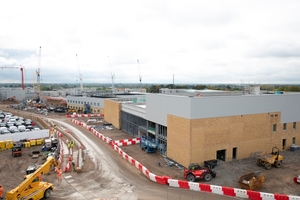UK’s greenest and most innovative prison unveiled
Deputy Prime Minister Dominic Raab has unveiled the greenest and most innovative jail in the country.

- new prison the greenest ever as the government moves towards operating as net zero in the future
- offenders will also be trained in jobs of the future boosting rehabilitation and cutting crime
The new prison at Glen Parva, Leicestershire, will play a crucial role in cutting crime by training up to 500 prisoners at a time in the skills of the future such as coding, recycling and waste management to help them find a job on release in new and emerging technologies and dramatically reduce their chances of reoffending.
All prisoners will also have access to in-cell technology to work towards a range of qualifications, such as maths, English, IT and engineering.
The major infrastructure project acts as a blueprint for the government’s ambitious prison-build programme, which will create 20,000 modern, rehabilitative places by the mid-2020s. The programme is backed by unprecedented funding of £3.8 billion confirmed in last week’s Spending Review.
Deputy Prime Minister, Lord Chancellor and Justice Secretary Dominic Raab said:
We are delivering the biggest and most innovative prison-building programme in a century.
Glen Parva represents the future, using in-cell technology to raise literacy and numeracy standards, and designing workshops to get offenders into work - to drive down re-offending, and protect the public.
In all, the new prison will be 35 per cent greener than HMP Berwyn in North Wales which was opened just 4 years ago.
The new prison, opening in 2023, has been largely built off-site using cutting edge technology – speeding up construction and minimising waste. Rubble from the old, demolished prison on this site has been reused and will use green energy including more than 960 solar panels and infrastructure for electric vehicle charging points.
The construction project has also piloted the use of power generators which have been converted from diesel use to be fuelled by specially treated vegetable oil – cutting CO2 by 90 per cent through this fossil-free technology.
Following on from Glen Parva, the next four new prisons have been specially designed to further cut carbon emissions by at least 85 per cent – ultimately saving 280,000 tonnes of carbon and slashing energy bills by £100 million.
As part of the government’s plans to build back greener and reach net zero by 2050, prisoners will also help to plant over 3,500 trees this winter, which will prevent 875 tonnes of carbon emissions during their lifetime. Tree nurseries will be established at a further seven prisons which will eventually grow 100,000 trees from seed every year and provide offenders with the opportunity to gain horticultural skills and qualifications – bolstering their chances of employment on release.
Offenders at HMP Garth are being trained up in the production of LED lights, which use 62 per cent less electricity and are expected to save the Prison Service around £2.5 million in energy costs a year once installed across the estate.
And an additional £12 million investment is funding the installation of solar panels at a further 19 prisons in England and Wales, bringing the total number of panels across the estate to over 20,000. More than 200 electric vehicle charging points are also being installed for staff across 40 jails.
Notes to Editors
- Our next 4 prisons will be built to operate as net zero in the future – see GOV.UK for further information
- when built, the new jail in Glen Parva will create around 1,700 modern prison places